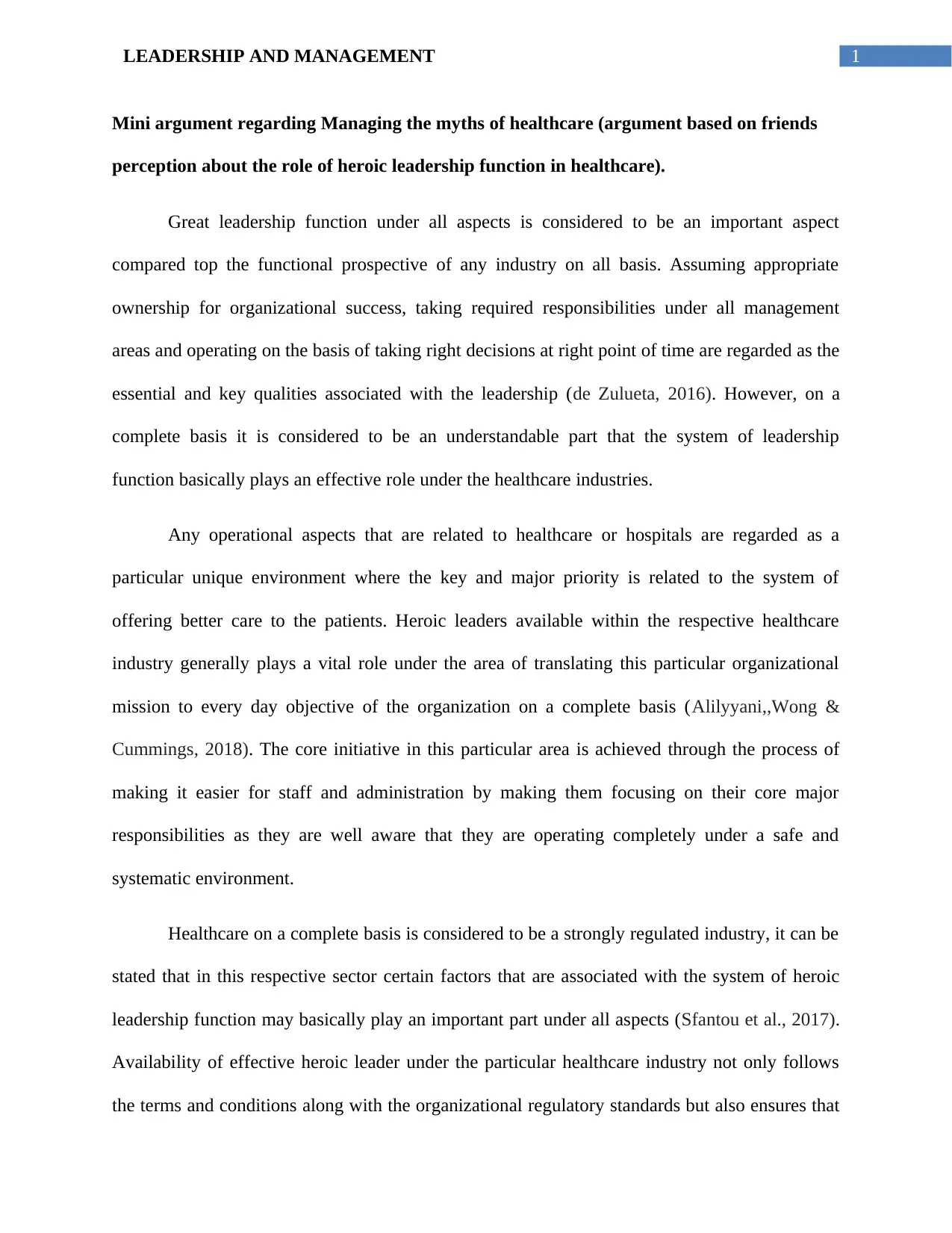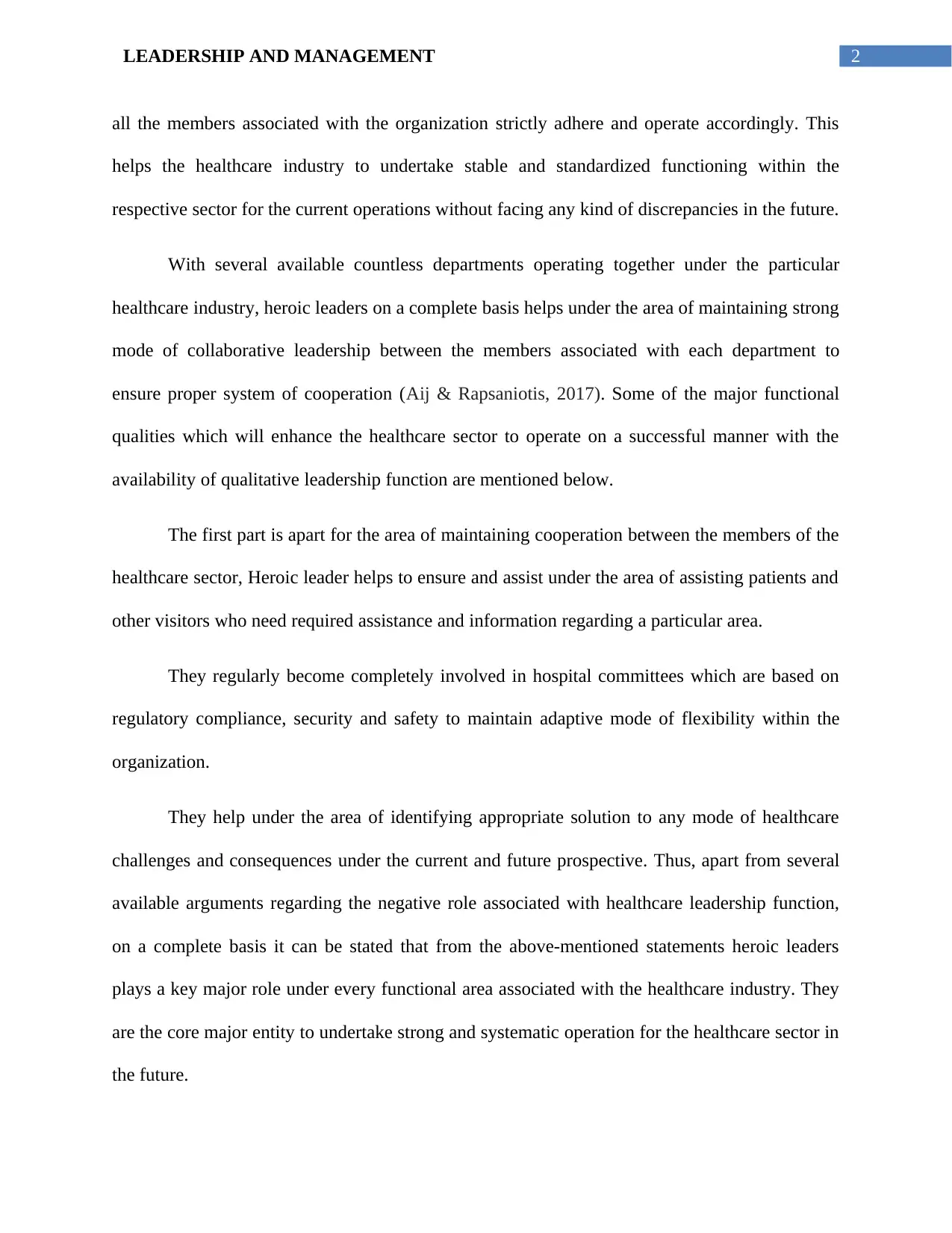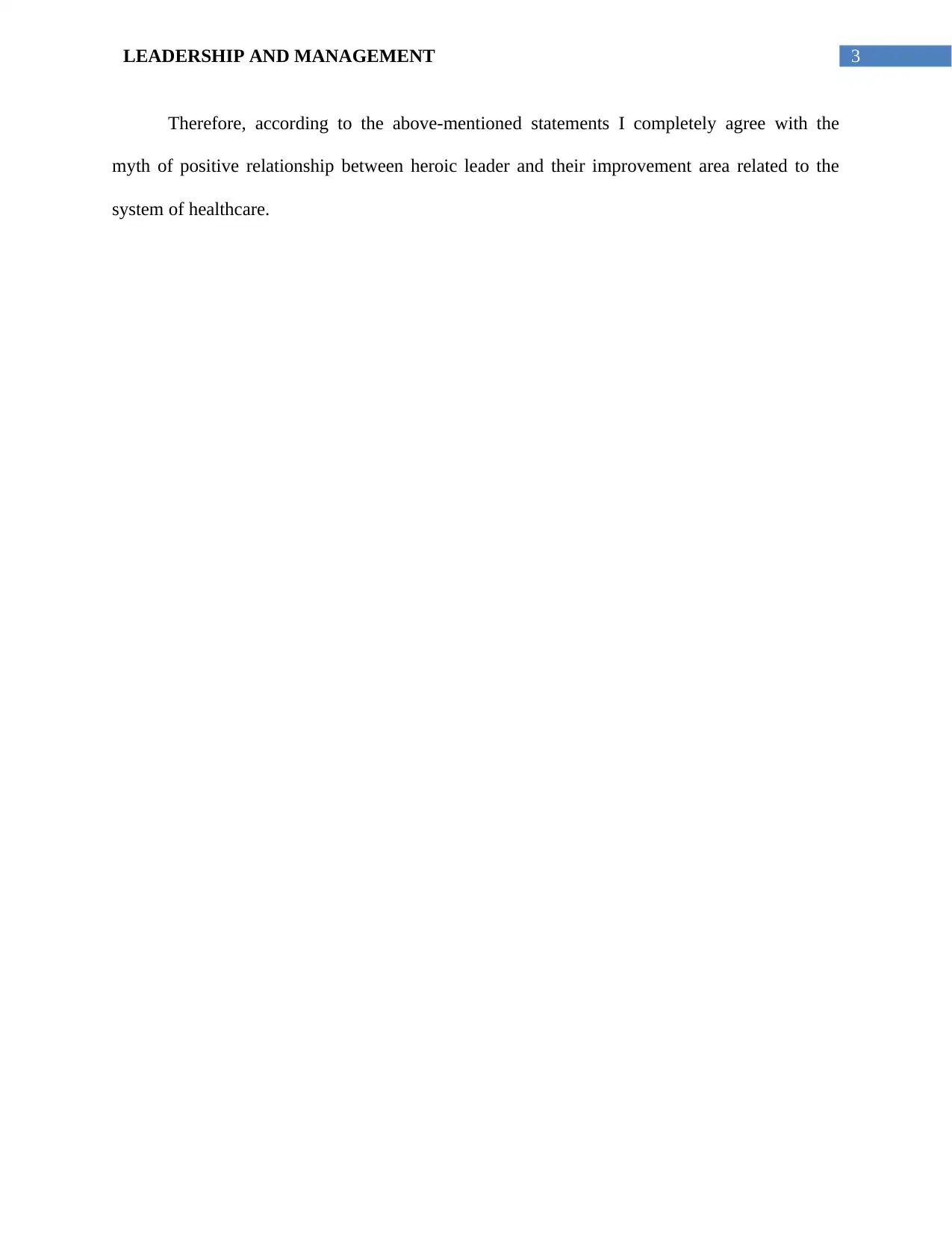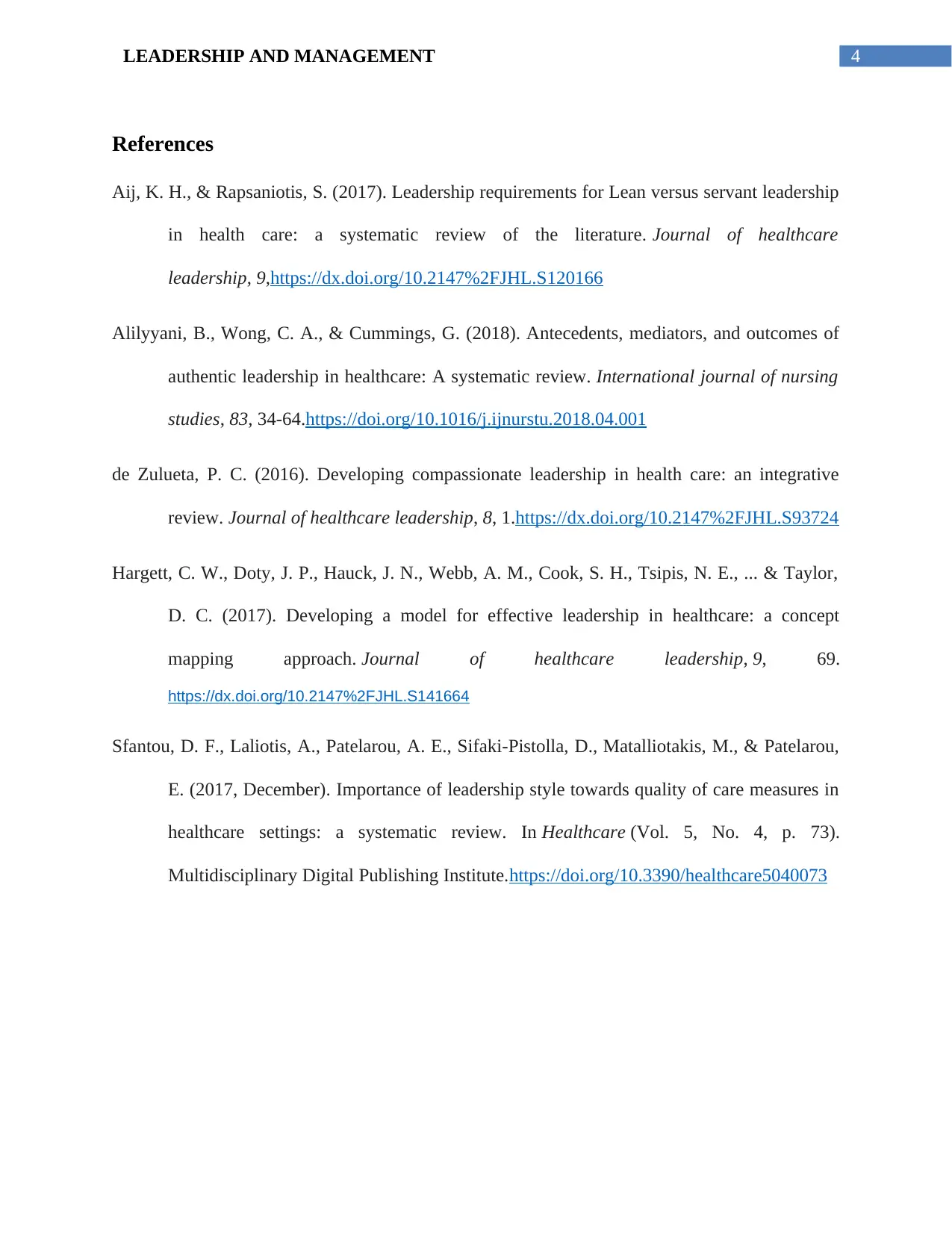Report: Leadership and Management in Healthcare: Myths and Analysis
VerifiedAdded on 2022/08/17
|5
|935
|13
Report
AI Summary
This report provides an analysis of leadership and management principles within the healthcare industry. It begins by examining the concept of heroic leadership, discussing its role in translating organizational missions into daily objectives and ensuring regulatory compliance. The report argues in favor of the positive relationship between heroic leadership and healthcare improvement. It also includes self-assessment quizzes on emotional intelligence, focusing on self-awareness, self-regulation, and motivation. The analysis discusses the importance of these aspects in effective leadership. The report also explores the differences between managers and leaders, highlighting the traits exhibited by leaders, such as being an ambassador and people mover, while acknowledging areas for improvement like creative building. The report references several studies to support its arguments and concludes with the importance of effective leadership for healthcare sector operations.

Running Head: LEADERSHIP AND MANAGEMENT
Leadership and Management
Name of the Student:
Name of the University:
Author Note:
Leadership and Management
Name of the Student:
Name of the University:
Author Note:
Paraphrase This Document
Need a fresh take? Get an instant paraphrase of this document with our AI Paraphraser

1LEADERSHIP AND MANAGEMENT
Mini argument regarding Managing the myths of healthcare (argument based on friends
perception about the role of heroic leadership function in healthcare).
Great leadership function under all aspects is considered to be an important aspect
compared top the functional prospective of any industry on all basis. Assuming appropriate
ownership for organizational success, taking required responsibilities under all management
areas and operating on the basis of taking right decisions at right point of time are regarded as the
essential and key qualities associated with the leadership (de Zulueta, 2016). However, on a
complete basis it is considered to be an understandable part that the system of leadership
function basically plays an effective role under the healthcare industries.
Any operational aspects that are related to healthcare or hospitals are regarded as a
particular unique environment where the key and major priority is related to the system of
offering better care to the patients. Heroic leaders available within the respective healthcare
industry generally plays a vital role under the area of translating this particular organizational
mission to every day objective of the organization on a complete basis (Alilyyani,,Wong &
Cummings, 2018). The core initiative in this particular area is achieved through the process of
making it easier for staff and administration by making them focusing on their core major
responsibilities as they are well aware that they are operating completely under a safe and
systematic environment.
Healthcare on a complete basis is considered to be a strongly regulated industry, it can be
stated that in this respective sector certain factors that are associated with the system of heroic
leadership function may basically play an important part under all aspects (Sfantou et al., 2017).
Availability of effective heroic leader under the particular healthcare industry not only follows
the terms and conditions along with the organizational regulatory standards but also ensures that
Mini argument regarding Managing the myths of healthcare (argument based on friends
perception about the role of heroic leadership function in healthcare).
Great leadership function under all aspects is considered to be an important aspect
compared top the functional prospective of any industry on all basis. Assuming appropriate
ownership for organizational success, taking required responsibilities under all management
areas and operating on the basis of taking right decisions at right point of time are regarded as the
essential and key qualities associated with the leadership (de Zulueta, 2016). However, on a
complete basis it is considered to be an understandable part that the system of leadership
function basically plays an effective role under the healthcare industries.
Any operational aspects that are related to healthcare or hospitals are regarded as a
particular unique environment where the key and major priority is related to the system of
offering better care to the patients. Heroic leaders available within the respective healthcare
industry generally plays a vital role under the area of translating this particular organizational
mission to every day objective of the organization on a complete basis (Alilyyani,,Wong &
Cummings, 2018). The core initiative in this particular area is achieved through the process of
making it easier for staff and administration by making them focusing on their core major
responsibilities as they are well aware that they are operating completely under a safe and
systematic environment.
Healthcare on a complete basis is considered to be a strongly regulated industry, it can be
stated that in this respective sector certain factors that are associated with the system of heroic
leadership function may basically play an important part under all aspects (Sfantou et al., 2017).
Availability of effective heroic leader under the particular healthcare industry not only follows
the terms and conditions along with the organizational regulatory standards but also ensures that

2LEADERSHIP AND MANAGEMENT
all the members associated with the organization strictly adhere and operate accordingly. This
helps the healthcare industry to undertake stable and standardized functioning within the
respective sector for the current operations without facing any kind of discrepancies in the future.
With several available countless departments operating together under the particular
healthcare industry, heroic leaders on a complete basis helps under the area of maintaining strong
mode of collaborative leadership between the members associated with each department to
ensure proper system of cooperation (Aij & Rapsaniotis, 2017). Some of the major functional
qualities which will enhance the healthcare sector to operate on a successful manner with the
availability of qualitative leadership function are mentioned below.
The first part is apart for the area of maintaining cooperation between the members of the
healthcare sector, Heroic leader helps to ensure and assist under the area of assisting patients and
other visitors who need required assistance and information regarding a particular area.
They regularly become completely involved in hospital committees which are based on
regulatory compliance, security and safety to maintain adaptive mode of flexibility within the
organization.
They help under the area of identifying appropriate solution to any mode of healthcare
challenges and consequences under the current and future prospective. Thus, apart from several
available arguments regarding the negative role associated with healthcare leadership function,
on a complete basis it can be stated that from the above-mentioned statements heroic leaders
plays a key major role under every functional area associated with the healthcare industry. They
are the core major entity to undertake strong and systematic operation for the healthcare sector in
the future.
all the members associated with the organization strictly adhere and operate accordingly. This
helps the healthcare industry to undertake stable and standardized functioning within the
respective sector for the current operations without facing any kind of discrepancies in the future.
With several available countless departments operating together under the particular
healthcare industry, heroic leaders on a complete basis helps under the area of maintaining strong
mode of collaborative leadership between the members associated with each department to
ensure proper system of cooperation (Aij & Rapsaniotis, 2017). Some of the major functional
qualities which will enhance the healthcare sector to operate on a successful manner with the
availability of qualitative leadership function are mentioned below.
The first part is apart for the area of maintaining cooperation between the members of the
healthcare sector, Heroic leader helps to ensure and assist under the area of assisting patients and
other visitors who need required assistance and information regarding a particular area.
They regularly become completely involved in hospital committees which are based on
regulatory compliance, security and safety to maintain adaptive mode of flexibility within the
organization.
They help under the area of identifying appropriate solution to any mode of healthcare
challenges and consequences under the current and future prospective. Thus, apart from several
available arguments regarding the negative role associated with healthcare leadership function,
on a complete basis it can be stated that from the above-mentioned statements heroic leaders
plays a key major role under every functional area associated with the healthcare industry. They
are the core major entity to undertake strong and systematic operation for the healthcare sector in
the future.
⊘ This is a preview!⊘
Do you want full access?
Subscribe today to unlock all pages.

Trusted by 1+ million students worldwide

3LEADERSHIP AND MANAGEMENT
Therefore, according to the above-mentioned statements I completely agree with the
myth of positive relationship between heroic leader and their improvement area related to the
system of healthcare.
Therefore, according to the above-mentioned statements I completely agree with the
myth of positive relationship between heroic leader and their improvement area related to the
system of healthcare.
Paraphrase This Document
Need a fresh take? Get an instant paraphrase of this document with our AI Paraphraser

4LEADERSHIP AND MANAGEMENT
References
Aij, K. H., & Rapsaniotis, S. (2017). Leadership requirements for Lean versus servant leadership
in health care: a systematic review of the literature. Journal of healthcare
leadership, 9,https://dx.doi.org/10.2147%2FJHL.S120166
Alilyyani, B., Wong, C. A., & Cummings, G. (2018). Antecedents, mediators, and outcomes of
authentic leadership in healthcare: A systematic review. International journal of nursing
studies, 83, 34-64.https://doi.org/10.1016/j.ijnurstu.2018.04.001
de Zulueta, P. C. (2016). Developing compassionate leadership in health care: an integrative
review. Journal of healthcare leadership, 8, 1.https://dx.doi.org/10.2147%2FJHL.S93724
Hargett, C. W., Doty, J. P., Hauck, J. N., Webb, A. M., Cook, S. H., Tsipis, N. E., ... & Taylor,
D. C. (2017). Developing a model for effective leadership in healthcare: a concept
mapping approach. Journal of healthcare leadership, 9, 69.
https://dx.doi.org/10.2147%2FJHL.S141664
Sfantou, D. F., Laliotis, A., Patelarou, A. E., Sifaki-Pistolla, D., Matalliotakis, M., & Patelarou,
E. (2017, December). Importance of leadership style towards quality of care measures in
healthcare settings: a systematic review. In Healthcare (Vol. 5, No. 4, p. 73).
Multidisciplinary Digital Publishing Institute.https://doi.org/10.3390/healthcare5040073
References
Aij, K. H., & Rapsaniotis, S. (2017). Leadership requirements for Lean versus servant leadership
in health care: a systematic review of the literature. Journal of healthcare
leadership, 9,https://dx.doi.org/10.2147%2FJHL.S120166
Alilyyani, B., Wong, C. A., & Cummings, G. (2018). Antecedents, mediators, and outcomes of
authentic leadership in healthcare: A systematic review. International journal of nursing
studies, 83, 34-64.https://doi.org/10.1016/j.ijnurstu.2018.04.001
de Zulueta, P. C. (2016). Developing compassionate leadership in health care: an integrative
review. Journal of healthcare leadership, 8, 1.https://dx.doi.org/10.2147%2FJHL.S93724
Hargett, C. W., Doty, J. P., Hauck, J. N., Webb, A. M., Cook, S. H., Tsipis, N. E., ... & Taylor,
D. C. (2017). Developing a model for effective leadership in healthcare: a concept
mapping approach. Journal of healthcare leadership, 9, 69.
https://dx.doi.org/10.2147%2FJHL.S141664
Sfantou, D. F., Laliotis, A., Patelarou, A. E., Sifaki-Pistolla, D., Matalliotakis, M., & Patelarou,
E. (2017, December). Importance of leadership style towards quality of care measures in
healthcare settings: a systematic review. In Healthcare (Vol. 5, No. 4, p. 73).
Multidisciplinary Digital Publishing Institute.https://doi.org/10.3390/healthcare5040073
1 out of 5
Related Documents
Your All-in-One AI-Powered Toolkit for Academic Success.
+13062052269
info@desklib.com
Available 24*7 on WhatsApp / Email
![[object Object]](/_next/static/media/star-bottom.7253800d.svg)
Unlock your academic potential
Copyright © 2020–2026 A2Z Services. All Rights Reserved. Developed and managed by ZUCOL.





